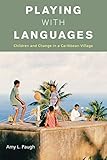Playing with Languages : Children and Change in a Caribbean Village / Amy L. Paugh.
Material type: TextPublisher: New York ; Oxford : Berghahn Books, [2012]Copyright date: ©2012Description: 1 online resource (264 p.)Content type:
TextPublisher: New York ; Oxford : Berghahn Books, [2012]Copyright date: ©2012Description: 1 online resource (264 p.)Content type: - 9781782385165
- 9780857457615
- online - DeGruyter
| Item type | Current library | Call number | URL | Status | Notes | Barcode | |
|---|---|---|---|---|---|---|---|
 eBook
eBook
|
Biblioteca "Angelicum" Pont. Univ. S.Tommaso d'Aquino Nuvola online | online - DeGruyter (Browse shelf(Opens below)) | Online access | Not for loan (Accesso limitato) | Accesso per gli utenti autorizzati / Access for authorized users | (dgr)9780857457615 |
Frontmatter -- Contents -- List of Maps, Figures, and Tables -- Acknowledgments -- Note on Transcription -- Introduction -- Chapter 1 Discourses of Differentiation, Unity, and Identity -- Chapter 2 Childhood in a Village “Behind God’s Back” -- Chapter 3 Learning English: Language Ideologies and Practices in the Classroom and Home -- Chapter 4 Becoming “Good for Oneself ”: Patwa and Autonomy in Language Socialization -- Chapter 5 Negotiating Play: Children’s Code-Switching as Symbolic Resource -- Chapter 6 Acting Adult: Children’s Language Use in Imaginary Play -- Conclusion -- Bibliography -- Index
restricted access online access with authorization star
http://purl.org/coar/access_right/c_16ec
Over several generations villagers of Dominica have been shifting from Patwa, an Afro-French creole, to English, the official language. Despite government efforts at Patwa revitalization and cultural heritage tourism, rural caregivers and teachers prohibit children from speaking Patwa in their presence. Drawing on detailed ethnographic fieldwork and analysis of video-recorded social interaction in naturalistic home, school, village and urban settings, the study explores this paradox and examines the role of children and their social worlds. It offers much-needed insights into the study of language socialization, language shift and Caribbean children’s agency and social lives, contributing to the burgeoning interdisciplinary study of children’s cultures. Further, it demonstrates the critical role played by children in the transmission and transformation of linguistic practices, which ultimately may determine the fate of a language.
Mode of access: Internet via World Wide Web.
In English.
Description based on online resource; title from PDF title page (publisher's Web site, viewed 25. Jun 2024)


